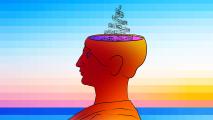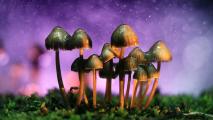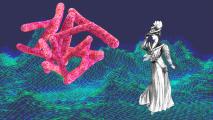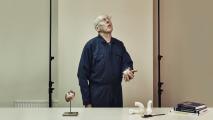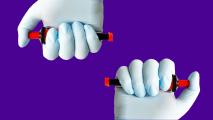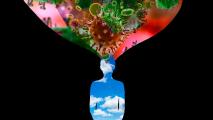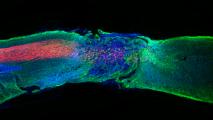
Biotech
Human history has been all but defined by death and disease, plague and pandemic. Advancements in 20th century medicine changed all of that. Now advancements in 21st century medicine promise to go even further. Could we bring about an end to disease? Reverse aging? Give hearing to the deaf and sight to the blind? The answer may be yes. And soon.
More
Is Omicron the COVID variant we have been waiting for?
There is no rule that will force Omicron or another COVID variant to become less deadly over time, but there is reason for hope.
How music can rewire the brain after an injury
MedRhythms, an experimental digital therapy combines sensors and music to help people with Parkinson’s disease walk.
VR shows parents what will happen in their baby’s surgery
A U.K. hospital is using VR to help parents see the potential impact skull-reshaping surgery could have on their baby’s appearance.
Genetically modified worms sniff out cancer in urine
Genetically modified worms that react to the scent of cancer in urine could one day be used for routine pancreatic cancer screening.
This device can automatically detect and reverse opioid overdoses
Researchers at the University of Washington have developed an AI-powered wearable to detect, and reverse via naloxone injection, opioid overdoses.
The science behind “anti-aging” diets
A recent study reviewed the efficacy of popular diets that claim to have anti-aging benefits.
How the new coronavirus variant was found and what we know so far
Omicron is a new ‘variant of concern’ but there’s still so much about it that we don’t know.
A patch to treat peanut allergies appears safe to wear for years
A peanut allergy can be debilitating at best, and life threatening at worst. A new possible treatment looks to be safe to wear for at least three years.
7 scientists we are thankful for this Thanksgiving
One of these scientists saved more lives than any other person in history.
Psychedelics can change how you think about the universe
A new study finds that a single trip on a psychedelic can cause lasting changes in a person’s metaphysical beliefs.
Tuberculosis may spread through aerosols, without coughing
University of Cape Town researchers believe tuberculosis may spread in small aerosols, much like COVID-19.
Can CRISPR keep the beer flowing?
Researchers are turning to CRISPR to create barley better able to remain dormant in climate change — while being still ready to make beer.
This engineer fixed his own heart
When Tal Golesworthy was told he was at risk of his aorta bursting, he wasn’t impressed with the surgery on offer – so he came up with his own idea.
How a BBQ lighter can make DNA vaccines more powerful
Georgia Tech researchers turned a BBQ lighter into a delivery system that uses electricity to boost the potency of DNA vaccines.
Vaccine robot administers doses without needles or human help
Canadian startup Cobioni has built a vaccine robot that can deliver a dose into a patient’s arm without a needle or any human help.
Second patient clears own body of HIV, hinting cure is possible
Two “elite controllers” that no longer have any replicable HIV virus in their bodies may hold the key to a cure for HIV.
“Dancing” molecules repair spinal cord injuries in paralyzed mice
A treatment for spinal cord injuries was able to reverse paralysis in mice by “dancing” to connect with cells near the site of the injury.
10 surprising things we’ve learned about death
Modern science has demystified death by divulging its biological processes, but many questions remain.
Survival genes from the world’s harshest desert environment could save our crops
Researchers have discovered genes linked to plant survival in Chile’s Atacama Desert, one of the world’s harshest desert environments.
Psilocybin treatment relieves depression in largest trial yet
The largest psilocybin treatment trial to date suggests that the psychedelic drug can help people with treatment-resistant depression.
Get inspired with the most innovative stories shaping the world around us.














